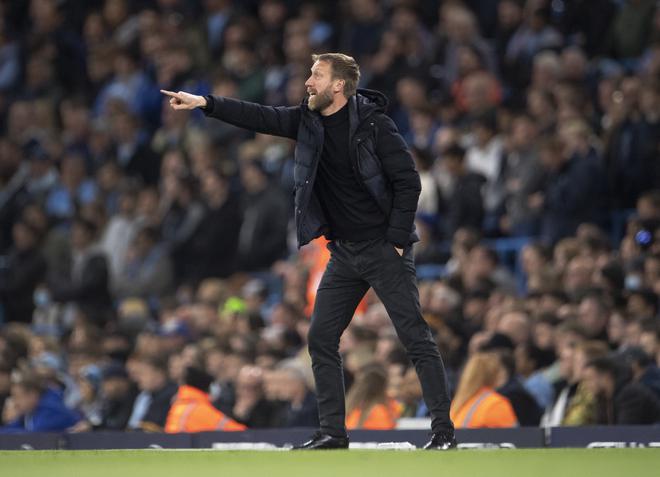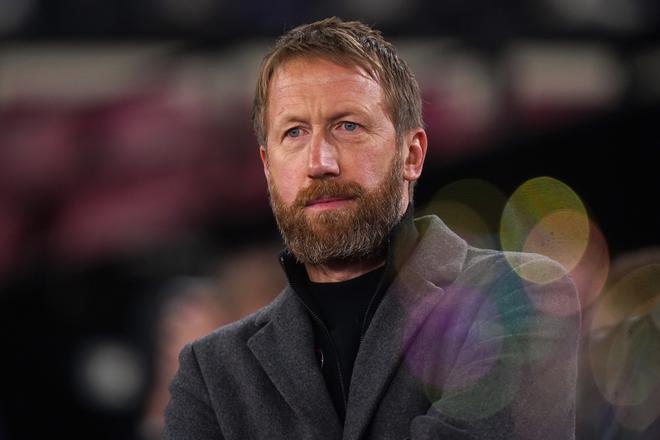

For some, Graham Potter’s appointment as Chelsea manager came out of left field. But for those who work within football, have managed against Potter or are fans of the tactical and analytical aspects of the game, it was a no-brainer.
When you get rid of Thomas Tuchel, widely regarded as an astute and influential coaching mind, you cannot afford to skimp on training-ground pedigree. While Potter wasn’t the biggest or most fashionable name available, his work — and the respect it has evoked among truly great managers — convinced Chelsea’s top bosses.
Potter was confirmed as Chelsea manager last week, replacing Tuchel — the club’s Champions League-winning manager from last year — who was ruthlessly fired by chairman Todd Boehly. The American billionaire, who heads the consortium that completed a 4.25 billion pounds takeover of the club, said he was “thrilled” to bring Potter to Stamford Bridge. “He is a proven coach and an innovator in the Premier League who fits our vision,” Boehly said.
Potter was mooted as a candidate for the Manchester United job eventually filled by Erik ten Hag after masterminding Brighton’s highest-ever league finish of ninth last season despite operating on a limited budget. Under his stewardship, the Seagulls are fourth this season. But when Chelsea — currently sixth after spending around 250 million pounds in the summer window — came calling, Brighton was unable to stand in his way as he had a release clause in his contract.
Strong reputation
The 47-year-old Potter, who had spells at Swedish side Ostersund and Swansea City before taking charge of Brighton on England’s south coast, has earned a reputation as a coach who can significantly improve his players. He is widely admired as one of the country’s best tacticians and coaches a brave, entertaining style that has won plaudits if not trophies.
Potter’s teams play fluid, progressive football, driven by slick passing, constant rotation and heavy possession — even against ‘bigger’ teams. But while he emphasises a strong creative identity, he also sets his team up to defuse the opposition’s weapons. And, importantly, he is an adept coach of pressing and counter-pressing schemes, a non-negotiable in today’s game.
Potter’s flexible style, innovative methods and attention to detail at Brighton have won many admirers including Pep Guardiola and Jurgen Klopp, two of the game’s most successful managers and also two of its most significant figures, given their influence on its evolution.
“He obviously has a clear idea about football and he is doing a brilliant job,” Liverpool manager Klopp said of Potter a year ago. “He has brought a clear identity to how he wants his teams to play. He is an innovator and is adventurous.”
Manchester City manager Guardiola’s praise was even more emphatic. “We were in front of the best English manager right now,” Guardiola said after a fixture between City and Brighton. “As a spectator, I like to watch these teams. I like watching Brighton play. I recognise it. When I was a football player, I would love to play in this team.”
Inventive
With a background in higher education after a modest playing career — it included eight Premier League appearances at Southampton, but was mostly spent in the lower leagues — Potter is reputed for his out-of-the-box approach to man-management.
Not afraid to push his players outside their comfort zone, he once got his Ostersund squad to perform the ballet Swan Lake for the local community. It was in keeping with his philosophy of challenging his players’ mental processes and decision-making under pressure and encouraging them to use dance and music as forms of self-expression.
Potter understandably views his move to London as a step forward in his career, an opportunity, after years with a small purse, to show what he can do with an expensively assembled squad. “It’s the start of a really exciting period, I think,” he said in an interview with the club’s website. “[I spoke with] the new ownership who I was really, really excited with and impressed by. The history of the club speaks for itself, but it’s about trying to create that again in our own way. And to compete at the top and try and create a winning team, that’s a fantastic opportunity for me.”
But while Boehly has been convinced that Potter is the man to instil a long-term ethos and identity throughout the club at the start of the new era, the demands he will face at the Bridge will contrast sharply with those at his previous clubs. Chelsea will give Potter his first taste of dealing with the egos of superstar players, while coping with ultra-demanding new US owners.
“I try to find some common ground, try to build relationships, to try to communicate effectively on a daily basis and build respect, trust and honesty, so my starting point would always be the person first,” Potter said, about the challenge of dealing with big egos. “I think that you have to understand that they’re human beings first, and the key thing is to try to understand them, understand what motivates them and understand what they’re like as people.”
Tricky situation
The Englishman is also assuming charge at a volatile juncture in the club’s life. It’s the first season after the end of the 19-year tenure of Roman Abramovich, the Russian oligarch who had to sell the London club after being sanctioned by the British government for what it called his enabling of Russian President Vladimir Putin’s “brutal and barbaric invasion” of Ukraine.
Under Boehly, there has been a restructuring at the top, with the removal of senior personnel such as Petr Cech (technical advisor), Bruce Buck (chairman) and Marina Granovskaia (director), seemingly to ensure the club was breaking free from the Abramovich era.
The upheaval hasn’t been confined to the boardroom. There has been significant stress in the dressing room as well. Prior to his sacking, Tuchel’s relationships with his players had reportedly deteriorated and there were tensions with the club hierarchy.
It’s not the best of circumstances to inherit, and Potter will have to find his feet quickly. “He’ll be expected to win every week, to challenge for trophies,” said former Chelsea player and assistant coach Jody Morris. “It’s totally different to being in a club where you are expected to be mid-table and can go a couple of months without winning a game. You go a couple of games without winning at Chelsea and it’ll be totally different.”
Potter’s first match in charge — a 1-1 draw against RB Salzburg in the Champions League on Wednesday — will have given him a sense of the size of his task. His first night in the Bridge’s home dugout attracted more attention and scrutiny than the rest of his career. He was talked about and judged constantly, with ‘experts’ attempting to read meaning into his smallest twitches. He will need to win to keep the media off his back. It will also be interesting to observe how much patience the club’s owners have with him if the results aren’t immediately positive.
Boehly did hand Potter a five-year contract and spoke about looking forward to “supporting him, his coaching team and the squad in realising their full potential in the coming months and years”. But it remains to be seen whether Chelsea, renowned for regularly changing managers during the previous regime and after Tuchel’s swift exit under the current dispensation, allows Potter the time to bed in, so his ideas can take root.







